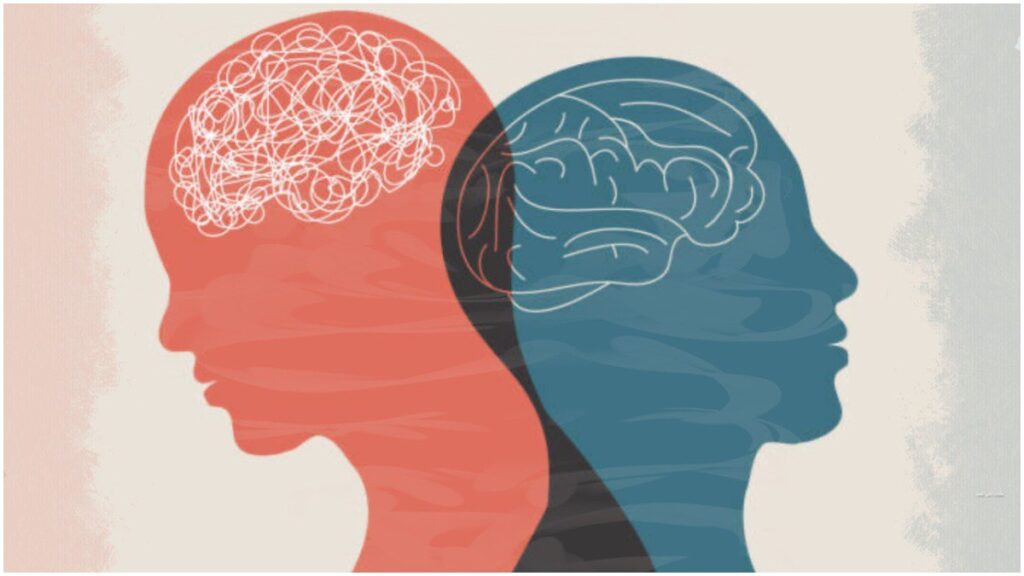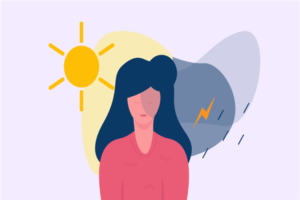Do you feel like your mood changes with the seasons? Are you more irritable and anxious in the winter, and happier in the summer? If so, you may be experiencing seasonal bipolar disorder. This is a form of bipolar disorder that is affected by the seasons. There are ways to deal with seasonal bipolar changes, and in this blog post, we will discuss them!
Contents
What Is Seasonal Bipolar Disorder? 
Seasonal bipolar disorder, also known as seasonal affective disorder (SAD), is a type of depression that occurs at the same time each year. For most people with seasonal bipolar disorder, symptoms begin in the fall or winter when days are shorter and there is less sunlight. For some people, seasonal bipolar disorder may improve in spring and summer. But for others, it may get worse.
However, a small number of people with seasonal bipolar disorder experience symptoms in the spring or summer. Furthermore, seasonal bipolar disorder is more common in women than men and it often begins in young adulthood.
Symptoms
SAD is a serious mental illness with a series of seasons. Seasonal bipolar disorder symptoms are similar to those of other types of depression, but they tend to be more severe. Some physical and psychological symptoms may include:
- Headaches
- Stomach problems
- Muscle aches and pains.
- Feeling depressed most of the day, almost every day
- Loss of interest or pleasure in activities you once enjoyed
- Changes in appetite or weight
- Sleeping too much or having trouble sleeping
- Feeling slowed down or restless
- Feeling tired or having little energy
- Difficulty concentrating, remembering, or making decisions
- Feelings of worthlessness or guilt
- Thoughts of death or suicide
The above mentioned are some common signs 0f seasonal bipolar disorder.
Causes
There are a few different possible causes and some of them are as follows:
Circadian Rhythm 
The seasonal pattern of bipolar disorder is often associated with changes in circadian rhythms. Studies have shown that people with bipolar disorder have a higher risk of seasonal patterns when their circadian rhythms are out of sync with the natural light-dark cycle. This can happen during the winter months when there is less natural sunlight, or it can happen during times of major life stressors such as job loss or relationship problems.
Serotonin Levels
Serotonin is a neurotransmitter that plays a key role in mood regulation. Low levels of serotonin are associated with the seasonal affective disorder (SAD), which is characterized by depression, anxiety, and fatigue. Seasonal changes in serotonin levels may also be a risk factor for bipolar disorder.
For example, one study found that people with seasonal bipolar disorder had lower levels of serotonin during the winter months, compared to people with non-seasonal bipolar disorder and healthy controls. This suggests that seasonal changes in serotonin levels may contribute to the development of the seasonal bipolar disorder.
Family History
Having a family member with seasonal bipolar disorder may increase your risk of bipolar disorder. If you have seasonal bipolar disorder, your children have about a 50 percent chance of developing the condition themselves. This may be higher if you have multiple family members with seasonal bipolar disorder or if your symptoms are particularly severe.
Living Far From The Equator
Living far from the equator is a risk element for seasonal bipolar because it can disrupt the body’s natural circadian rhythms. The farther away you live from the equator, the more likely you are to experience seasonal changes in light exposure. This can throw off your body’s internal clock, which can lead to mood swings and other mental health problems.
Low Level Of Vitamin D
Seasonal bipolar disorder is a type of depression that occurs at the same time each year. For many people, this is during the winter months when there is less sunlight. Low levels of vitamin D have been linked to seasonal bipolar disorder. Vitamin D is important for mood regulation and helps to keep our immune system healthy. During the winter months, it can be difficult to get enough vitamin D from sunlight alone. This may contribute to seasonal bipolar disorder. Supplementing with vitamin D during the winter months may help to prevent seasonal bipolar disorder.
Consequences 
Seasonal bipolar can have many different consequences depending on the severity of the condition. In some cases, people may only experience mild symptoms that are manageable with medication and lifestyle changes. However, in other cases, seasonal bipolar can be much more severe and can lead to hospitalization or even suicide. Some of the most common consequences of seasonal bipolar include:
- Depression: People with seasonal bipolar often experience depressive episodes during certain times of the year, typically in winter or early spring. This can lead to problems with work, school, relationships, and everyday activities.
- Mania: During mania, people may feel excessively happy or energized. They may also act impulsively and engage in risky behaviors. This can lead to financial problems, legal trouble, and difficulty maintaining relationships.
- Emotional Imabalnce: Seasonal bipolar can cause extreme mood swings, which can be very difficult to deal with. This can lead to problems in relationships and difficulty functioning in day-to-day life.
- Lack Of Poor Performance: Many people experience a decline in their work or school performance during certain times of the year. This can be very frustrating and can lead to problems in relationships and difficulty maintaining employment. As you can see, seasonal bipolar can have a significant impact on a person’s life.
- Disengagement in life: seasonal bipolar can also lead to social isolation and withdrawal from activities that were once enjoyed. This can be very difficult for people who are used to being active and engaged in their lives.
One needs to be very well aware of the consequences of Bipolar Disorder in order to treat it well at the right time so that the situation doesn’t go out of control.
Diagnosis 
The most common way to diagnose seasonal affective disorder is by tracking your symptoms and moods over time. This can be done in a journal or diary, or with a special app designed for tracking mental health symptoms.
If you think you may have the seasonal affective disorder, talk to your doctor. He or she can help you make a diagnosis and find the best treatment for you. Your doctor may ask you questions about your sleep patterns, energy levels, and cravings for certain foods. To assess more properly, he may also ask about your family history of seasonal affective disorder or other mood disorders.
A blood test can also be done to check for a type of protein called tryptophan. This protein is involved in the production of serotonin, which is a chemical that helps regulate mood. People with seasonal affective disorder tend to have lower levels of tryptophan in their blood during the fall and winter months.
What Treatments May Be Suggested?
If you are diagnosed with seasonal affective disorder, treatment typically involves:
Light Therapy
Light therapy is one treatment option that can be helpful for some people with seasonal bipolar. It involves sitting in front of a special light box for a set amount of time each day. The light from the box can help to improve mood and energy levels. Light exposure is thought to trigger a chemical change in the brain that lifts your mood and helps regulate your body’s sleep-wake cycle. Light therapy is most effective when it is done within two hours of waking up in the morning.
Cognitive Behavioral Therapy
Counseling can help you identify and change any negative thinking patterns that might be contributing to your seasonal affective disorder.CBT is an effective treatment for seasonal bipolar disorder. It can help reduce symptoms, improve functioning, and prevent relapse.
CBT or Cognitive Behavioral Therapy is a type of psychotherapy that helps people change their negative thoughts and behaviors. The therapist works with the person to identify and challenge the negative thoughts and beliefs that are causing the problem behavior. Together, they develop new, more positive ways of thinking and behaving.
If you are struggling with seasonal bipolar disorder, consider seeking out a therapist who specializes in CBT. With proper treatment, you can overcome this condition and live a happy, healthy life.
Antidepressant Medications 
Antidepressants may help to regulate the levels of neurotransmitters in the brain. This helps to stabilize mood and prevent extreme highs and lows. For example, serotonin is a neurotransmitter that is thought to be involved in regulating mood.
Antidepressants that increase serotonin levels are SSRIs. Other neurotransmitters include Norepinephrine and Dopamine. Medications that affect these neurotransmitters (such as tricyclic antidepressants or MAOIs) can also be helpful. It’s important to work with a mental health professional to figure out which medication is right for you.
Supplements
Some people with the seasonal affective disorder may also benefit from taking supplements such as vitamin D or omega-three fatty acids. Vitamin D and omega-three fatty acids are both essential nutrients that play a role in seasonal bipolar disorder. Vitamin D is necessary for the body to absorb calcium, which is important for maintaining healthy bones and preventing depression. Omega-three fatty acids are involved in the production of neurotransmitters, which are chemicals that help regulate mood.
There are many different ways to get these nutrients, including through diet, supplements, and exposure to sunlight. It is important to speak with a doctor before taking any supplements, as they can interact with other medications. As always, please speak with your doctor before starting any new treatment. It is important to work with a healthcare team to find the best treatment plan.
Self Care Strategies 
Seasonal Bipolar Disorder follows a particular pattern. Symptoms usually start in winter and improve in the spring or summer. Self-care tips that may help you overcome this ailment include:
- Spend time outside every day. This can help you get natural light, which can improve your mood.
- Exercise regularly. This can help release endorphins, which can improve your mood.
- Eat a healthy diet. This can help stabilize your mood and give you the nutrients you need to stay healthy.
- Get enough sleep. This is important for overall health and can help reduce stress levels.
- Connect with others. This can help reduce isolation and loneliness, which are common triggers for seasonal bipolar disorder.
- Practice relaxation techniques. This can help you manage stress and anxiety.
- Avoid alcohol and drugs: This can help prevent further worsening of your symptoms.
- Keep a positive outlook. This can help you cope with seasonal bipolar disorder and reduce the risk of relapse.
Seasonal bipolar disorder can be difficult to manage, but there are self-care tips that may help. With the right strategy, you can overcome this condition and live the life you want to live.
Conclusion
Seasonal Bipolar is a real thing and people should be more understanding. People who suffer from the problem go through a lot every day, managing their symptoms and trying to lead normal lives. It is something that people have to live with and it can be very hard. Let’s break the stigma and open up the conversation so that more people feel comfortable seeking help. If we all work together, we can make a difference.
For more information, please contact MantraCare. Bipolar disorder is a mental illness characterized by extreme shifts in mood, energy, and activity levels. If you have any queries regarding Online Bipolar Disorder Counseling experienced therapists at MantraCare can help: Book a trial Bipolar Disorder therapy session









